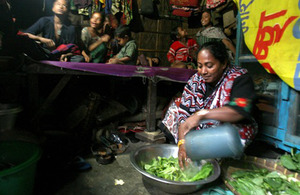MDGs in focus - MDG 4: Reduce child mortality
How a slum community in Dhaka, Bangladesh has improved water and sanitation and reduced killer diseases

Ranu Begum prepares food for her family with clean water. Picture: Charlie Bibby/FT courtesy of WaterAid
Ranu Begum understands the importance of clean water and hygiene. She lives, with her husband and 3 children, in Zakir’s slum in Dhaka. Thanks to the work of WaterAid and their local NGO partner DSK, funded by UKaid from DFID, she has helped to dramatically improve the health of her community and achieved a change in the the local goverment’s water policy.
Nearly 9 million children under the age of 5 die every year - often from easily preventable or treatable illnesses. Many die because they don’t have access to clean water and proper toilets. Faeces contaminates everything they touch, eat and drink, causing deadly diarrhoeal diseases.
Ranu paints a grim picture of life in the slum before the recent improvements to sanitation made possible by UKaid:
“When I came here in 2002 there were 2,000 families and only one water point. We used to collect water at night; there was a long queue of us. Being female, we had to collect it at night. During the day there were men and boys pushing us out of the way so it was so difficult. We needed the water for cooking and washing, so had no option but to start the water queue at night.
“Our families were suffering from jaundice fever and diarrhoeal diseases. The water was so dirty because there were so many hanging latrines. The whole slum was a hanging slum, above water. There were flies everywhere. Then, in 2005, we heard of DSK working in latrines and water and we approached them to ask how to change the situation of hanging latrines and all the diseases everywhere. We understood the connection between the hanging latrines and the diseases. Every day some of my neighbours went to the hospital about cholera.”
Ranu is the President of a the Zakir Bostw community-based organisation (CBO) which was formed with the help of DSK. The CBO analysed the community and the existing water and sanitation facilities and found that for 1500 people there were just 14 water connections (12 of which were illegal) and 36 hanging latrines.
After DSK’s intervention, the community had no hanging latrines, and had access to legal water connections, communal latrine blocks and 3 rubbish collection points.
“Now we are fine and healthy because our hands, nails and clothes are clean. We no longer go to the cholera hospital,” explains Ranu. ”Before, our clothes weren’t clean because of lack of water. Before, I never knew that washing hands before eating was so important. DSK not only provided us with water and sanitation but also educated us on how to improve our hygiene. We have children’s and adolescent girls’ groups to improve hygiene.”
“Now the situation is that we can get water for our cooking all the time in the day, so our families can eat on time and our children can go to school on time”, says Ranu. “We can wash our children every day. Now, at worst we wait two to three minutes for water. The time we used to spend collecting water we can now use for income generation and other business. Yesterday, this slum was declared 100% sanitised. Now, the water is very clean and we don’t fall sick.”
“Every 6 months we take a sample of the water to DSK for a bacteriological test to check it’s safe. Now, the water points are in our names legally. We pay the water bill, which is 1,360 taka per month per pump. Each pump is for about 20 households. Some households are charged 50 taka per month, some 30, some 20 and some, like the beggars, are never charged according to their ability to pay and which category they are in. Every household can take as much water as they need, we don’t measure how much people take. We acknowledge the richer households in this slum are subsidising the poor but we are happy with this. This is why we formed the committee - to help people. With the money we collect we have been able to employ a night guard and a van driver. We collect 10 taka per household for rubbish collection and we pay the driver to collect the rubbish and take it away at night.”
The bigger picture on child mortality
In years to come future generations will look back at the fact that 25,000 children die every day from easily preventable diseases in the same way as we look back at the slave trade today - with a mixture of incomprehension and amazement.
There has been progress in reducing under-five mortality, mainly achieved through successful childhood immunisation programmes. However, the MDG target is still significantly off-track. Additional effort is required.
The UK is now putting the health of women and children at the forefront of our aid efforts, and Nick Clegg and Andrew Mitchell will be pushing hard at the MDG Summit later this month for collective action on the most off-track MDGs, including maternal, newborn and child health.